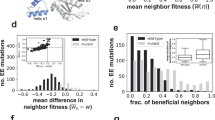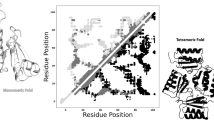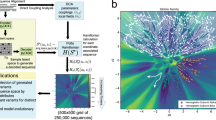Abstract
NATURAL proteins exhibit essentially two-state thermodynamics, with one stable fold that dominates thermodynamically over a vast number of possible folds, a number that increases exponentially with the size of the protein. Here we address the question of whether this feature of proteins is a rare property selected by evolution or whether it is in fact true of a significant proportion of all possible protein sequences. Using statistical procedures developed to study spin glasses, we show that, given certain assumptions, the probability that a randomly synthesized protein chain will have a dominant fold (which is the global minimum of free energy) is a function of temperature, and that below a critical temperature the probability rapidly increases as the temperature decreases. Our results suggest that a significant proportion of all possible protein sequences could have a thermodynamically dominant fold.
This is a preview of subscription content, access via your institution
Access options
Subscribe to this journal
Receive 51 print issues and online access
$199.00 per year
only $3.90 per issue
Buy this article
- Purchase on Springer Link
- Instant access to full article PDF
Prices may be subject to local taxes which are calculated during checkout
Similar content being viewed by others
References
Shakhnovich, E. I. & Gutin, A. M. Biophys. Chem. 34, 187–199 (1989).
Derrida, B. Phys. Rev. B24, 2613–2624 (1981).
Bryngelson, J. & Wolynes, P. G. Proc. natn. Acad. Sci. U.S.A. 84, 7524–7528 (1987).
Mezard, M., Parisi, G., Sourlas, N., Toulouse, G. & Virasoro, M. J. Phys. (France) 45, 843–854 (1984).
Derrida, B. & Toulouse, G. J. Phys. (France) Lett. 46, L223–L225 (1985).
Mezard, M., Parisi, G. & Virasoro, M. J. Phys.(France) Lett. 46, L217–L220 (1985).
Shakhnovich, E. & Finkelstein, A. Biopolymers 28, 1667–1694 (1989).
Myazawa, S. & Jernigan, R. Macromolecules 18, 534–552 (1985).
Author information
Authors and Affiliations
Rights and permissions
About this article
Cite this article
Shakhnovich, E., Gutin, A. Implications of thermodynamics of protein folding for evolution of primary sequences. Nature 346, 773–775 (1990). https://doi.org/10.1038/346773a0
Received:
Accepted:
Issue Date:
DOI: https://doi.org/10.1038/346773a0
This article is cited by
-
StructureDistiller: Structural relevance scoring identifies the most informative entries of a contact map
Scientific Reports (2019)
-
Diversity and evolution of the emerging Pandoraviridae family
Nature Communications (2018)
-
On the Origin of Protein Superfamilies and Superfolds
Scientific Reports (2015)
-
Amino acid composition of proteins reduces deleterious impact of mutations
Scientific Reports (2013)
-
Mathematical modeling and comparison of protein size distribution in different plant, animal, fungal and microbial species reveals a negative correlation between protein size and protein number, thus providing insight into the evolution of proteomes
BMC Research Notes (2012)
Comments
By submitting a comment you agree to abide by our Terms and Community Guidelines. If you find something abusive or that does not comply with our terms or guidelines please flag it as inappropriate.



